Peter MALONE
Saturday, 18 September 2021 19:52
24 Hour Party People
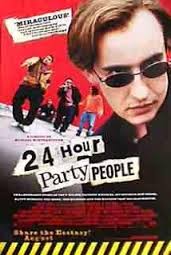
24 HOUR PARTY PEOPLE
UK, 2002, 117 minutes, Colour.
Steve Coogan, Paddy Considine, Shirley Henderson, Lennie James, Ron Cook, John Simm, Andy Serkis, Christopher Ecclestone, Simon Pegg, Rob Brydon.
Directed by Michael Winterbottom.
A long time ago (well, from 1981 at least), in a far, far galaxy (well, Manchester, UK), Rave Clubs came into being. Michael Winterbottom is a top director and this film is made with flair.
However, its main appeal will be to a younger demographic as they say and one that is familiar with some of the characters whose careers, lives (and deaths) are dramatised here.
Despite a fine performance by Steve Coogan as entrepreneur Tony Wilson, the film does not open up to audiences unfamiliar with the times, the places, the people and the issues.
1. A slice of UK music history? Television, bands, performances?
2. The title, focus on Tony Wilson, his providing a venue for music, dance? The work of Michael Winterbottom? Collaborations with Steve Coogan? Manchester life?
3. The range of bands, from the 1970s and 1980s? Individuals, leaders, singers, performances? The development of other bands? A focus on Joy Division, on Ian Curtis, other singers and bands?
4. Tony Wilson, the opening with the hang gliding, his television program, And So It Goes…? Seeing different programs through the film?
5. Wilson as a personality, his talking to the audience in explaining the history, that the film was not about himself but about the music and the bands? His involvement? His personal life, marriage to Lindsay, their relationship, sharing, the work, his going to the van, the sexual encounter? Lindsay and her revenge? The second marriage, not prominent, his wife in hospital, his talk about his children?
6. The idea for The Factory? The music? The discussions, the venue, discussions with Tony, the owner, Wilson’s petulance about the name, priorities? Rob and the others associated with the development of The Factory? The various characters, their singing capacities, auditions, Wilson’s response? The opening, small? Growing? His comment on how many were at the Last Supper? His record label, Joy Division? The focus on Ian Curtis, his personality, his performance, his anger, antagonism towards Wilson, his death after listening to the music, killing himself, lying in his coffin?
7. The aftermath, the establishment of the Hacienda and the crowds, the dancing, its success?
8. Wilson and his personal behaviour, people working as his assistants, the clashes, his domination, the board meetings, the clashes with Rob? The technicians? Advice?
9. Looking at this era in English music in retrospect?
Published in Movie Reviews
Published in
Movie Reviews
Tagged under
Saturday, 18 September 2021 19:52
God Bless America
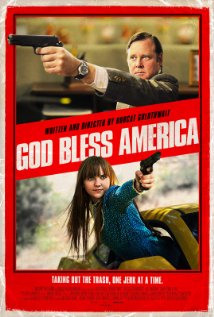
GOD BLESS AMERICA
US, 2012, 105 minutes, Colour.
Joel Murray, Tara Lynne Barr,
Directed by Bobcat Goldthwait.
No, it’s not the kind of title that evokes traditional patriotism. The patriotism here is a severe questioning of contemporary American values, especially contemporary media and communications. Many a member of the audience will be emotionally applauding the targets of this very black satire. It involves gun culture as well.
Bobcat Goldthwait used to be a comic actor (in the Police Academy films) but has turned to directing recently, films with unexpectedly black tones (like The World’s Greatest Father). This one is even blacker. There is a great deal of funny dialogue (including a very amusing critique of Diablo Cody and her film, Juno).
Joel Murray (looking a cross between Dan Aykroyd and his brother, Bill Murray, plays Frank, a middle-aged man, at the end of this tether who is told he is terminally ill. No job, his wife and daughter alienated. He watches television – and takes a dead set against reality TV shows. By this stage of the film, many more in the audience will be on side with him. And, even though he decides that he will rid the US of repellent characters, and has guns to achieve it, the same audiences will be torn by their desire to support the riddance of the repellents and the use of the violent means that Frank uses to achieve it.
He travels the countryside, discovering more and more people who give a bad name to humanity. He also encounters a young runaway (Tara Lynne Barr) who discovers a soul-mate in Frank. There were Bonnie and Clyde, then Natural Born Killers (which also targeted the exploitative media), now Frank and Roxy. The mitigating circumstances are that it is only the obnoxious who are got rid of, not good citizens.
The on-side viewer will relish, in a ghoulish kind of way, the portrayals of these awful people (both old and young).
The nature of satire is to set up society in the darkest way and attack it. It is obviously exaggerated and stylized. It is not realistic. It is a contrived way of storytelling, that asks questions by taking extreme stances. Unfortunately, some crazed individuals in society, especially American society, have taken their guns and caused mayhem and tragic loss of life.
A warning that this is a clever kind of satiric comedy which is meant to be provocative. For those who can appreciate it, it is well-targeted.
1. The title and expectations? The focus on America, as a God-fearing nation, its standards – and its failures?
2. The film as satire, the purpose of satire, attacking a world, undermining the status quo? Speaking the truth, no matter how viciously? The range of targets: television programs and right-wing personalities, their mocking ordinary people, Mike Fuller? The talent shows, Stephen and his singing the theme from Mahogany, terrible, everybody laughing? Frank and his channel surfing, glib advertisements, the girls of the television seriesand the used tampon? Carry-on of the spoilt daughter, demanding and her parents, permissive?
3. The introduction to Frank, his age, personality, work, his lifestyle, the family next door and the noise of the child, his dreaming of killing them? The car parked hemming him in, the walk to the office, chatting with the girl at reception, everybody talking about Steve and the votes, Frank and his speech on decency and civilisation? The associate at the other desk, listening, quoting from talk shows and votes for talent quests? His giving the girl at reception the book? Called to the office, charged with sexual harassment, pleading his cause, orders from upstairs…, Letting him go? Getting the book back? Going to the doctor, the visuals of the tumour, the casual aspects of the doctor’s behaviour, taking the phone call, talking about his car deal? The doctor hoping he would not sue?
4. Frank and his making a decision, get his car, Chloe as the first target, the television scenes with her parents, his trying to burn her car, frustration, shooting her?
5. Zoe walking past, watching him, suspicious of him with the binoculars? Seeing what he did? Admiring him, talking with him, her ideology? The list of types who deserve death? Their going to Chloe’s parents, Frank and the confrontation with the father, chasing the mother, shooting, Zoe and her stabbing the mother with the knife? In the motel, people who deserve to die? The television information?
6. The episode in the cinema, the three talking, the film about Vietnam, the man in the front on the phone and his lies, the girl on the phone, popcorn, the group making noise? Frank shooting them all, sparing the woman who was courteous? Television interview and her saying that she was not killed because she was polite?
7. Killing Mike Fuller, the discussion about his politics, Zoe disagreeing, Frank agreeing with some but killing him because he was so mean?
8. Drive-by, the meal, the blood, the attendant offering more napkins? Hosing the blood off?
9. Zoe, self-image, their going shopping, in the supermarket? Frank and his concern about propriety, Zoe under age? Her wanting him to say that she looked good and was pretty? Her massaging and getting rid of his headaches?
10. Frank telling her to go? Her reaction? His emphasis on propriety and knowing boundaries and what was appropriate?
11. His buying the guns, the enthusiasm of the gun salesmen and the racism in his conversation?
12. Stephen, the recurring singing of the theme from Mahogany, on all the stations, his becoming a celebrity despite his being tone deaf? People laughing at him?
13. Frank going to the studio, for the talent programme? Killing the attendants, confronting the judges, criticising their speeches, shooting them? Zoe coming to the stage, guns, killing spree and spraying the audience, their being shot and killed?
14. The significant points made about contemporary culture? Audience ambiguous response to the justice of the criticism but the behaviour and the ruthlessness of the killing?
Published in Movie Reviews
Published in
Movie Reviews
Tagged under
Saturday, 18 September 2021 19:52
Starbuck
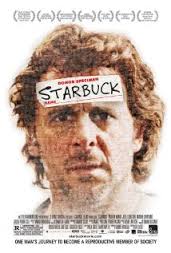
STAR BUCK
Canada, 2011, 109 minutes, Colour.
Patrick Huard, Julie Le Breton, Antoine Bertrand.
Directed by Ken Scott.
Starbuck is an offbeat story, written and directed by Ken Scott. He soon adapted his screenplay for an American version, Delivery Man, a star vehicle for Vince Vaaughn.
Patrick Huard stars as a likeable loser, David Wozniak, an irresponsible man. He works for his father and with his brothers in meat company, he doing the deliveries but always getting waylaid, getting parking fines, even getting his truck towed away when he should have been delivering baseball basketball jerseys to his father. He also owes money for a loan in a company that failed and thugs are after him. If the film continued in this vein, it might have just been an average film.
Then, the key plot element is reserved revealed. David gave over 600 sperm donations to a clinic in the 1990s. It was a way of raising money. The name used on the documents kept his anonymity and was Starbuck. Now a group of the children, 161 of the 533 conceptions from the donations, have instituted a lawsuit for him to come out of his anonymity. He has the friendship and help of his lawyer who struggles with children of his own and is keen on preserving David’s anonymity and getting him damages.
What happens is that David starts to investigate the lives of some of the children, papering his wall with the official documents about 533. He discovers a struggling actor who finds a job; he works with a young addicted woman and gets her to promise to go to her job in Bloomingdales; he supports a busker in the street, sees another son as a tour guide and listens to him frequently, even in the rain, and there is pathos when he finds that one of the sons is severely disabled, going to visit him, not knowing what to say, but forming a bond.
One day he follows one of the children, a gay man, who leads him to a meeting of the children where he suggests to them, still anonymously, that what they have discovered is a whole range of brothers and sisters and that they should be joyful about this. Ultimately there is a court case, reasons being put forward for his anonymity and his preservation of privacy as well is the reasons for the revelation for the sake of the children to know something about themselves and their parentage.
Of course, there are ethical issues in the whole sperm donation issue and how it was handled by the clinic. But given that the situation has arisen, there are ethical questions about what David should do and what the children have a right to. The film does gather together the various arguments and it ends with a heart answer over a head answer. And, in real life, which is more important?
1. The title, the delivery in David’s job, the delivery of the children?
2. A Canadian urban story, life in the city, the streets, the shops and abattoirs, buildings, deliveries, the different venues to meet the children, the hospital? Realism, if the story seems surreal, for David and for the audience?
3. The basic premise, sperm donation, over 600 in a short period, the clinic using the sperm and the result of 533 children? The film showing the children, their lawsuit? The absent parents?
4. Introduction to David, a seeming loser, the story of his family, his father coming from Poland, his father, the $10? Starting poor, the company, meat, the brothers working in the shop, the shop itself, the range of deliveries, having their baseball team, David and his getting the jerseys, the fines, the truck towed away? Only himself in the uniform in the photo? His relationship with Valerie, casual, discovering that she was pregnant? Her urging him to get a life? David’s lawyer friend, his friends, the lawsuit, his own children, the ironic comment with the scenes with him and his children and his observations about having children? David, his owing the money, the thugs arriving, in the bath? The phone calls and his inability to borrow from anyone?
5. His prospects, the 533 children, the sheets, putting them on his wall, the discussions with the lawyer and the lawsuit, his wanting anonymity? The prospect of damages?
6. His beginning to see the children, the effect on him, the young actor getting the job, the addict and the pizza delivery, his concern, taking her to hospital, a promise to go to the department store and fulfilling it, the lifeguard and his jumping into the pool, the busker and supporting him on the street, the tour guide, even in the rain with no customers?
7. Following the gay man, his meeting the girl, discovering himself at the meeting about himself, his name Starbuck, his getting up, urged to speak, reminding them that they had discovered that they were brothers and sisters? The isolated young man confronting him, his interest in philosophy, books of quotations, wanting to stay with David, the long stay, David feeling desperate, inviting him to the baseball game and his ineptitude?
8. Valerie, her character, pregnancy, asking David to come to the scan, the effect on him?
9. The lawyer and his speech for the claim, the children listening, their ironic comments?
10. In court, the range of children, the arguments, the reasons given on each side, the judgment?
11. Thehe television interview, blurting out David’s name, his mother’s reaction to his excusing himself that he was David’s partner?
12. David’s father, not supporting him, calling him to him, the revelation, the story of the family, the $10, and his giving him his inheritance in cash to pay the debts? David forgoing the money from the case?
13. David, typing out the message, the revelation of who was Starbuck, the reactions, going to the hospital, the birth of his daughter, the gifts from all the children?
14. Meeting the children, the group hug?
15. The basic ethical issues, in vitro fertilisation, the place of the parents? The responsibility of the donor? David finding himself in the situation with the children and dealing with it?
Published in Movie Reviews
Published in
Movie Reviews
Tagged under
Saturday, 18 September 2021 19:52
Sweetest Thing, The
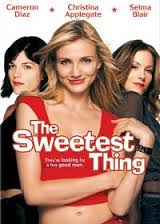
THE SWEETEST THING
At the end of the press screening, a fellow reviewer said to me that this film suggested a new classification: No admittance to anyone over 25! This is a film that reflects the lives of well-off singles clubbers, successful in their careers, casual in their relationships, verging on 30 and wondering if they will find fulfilment.
Cameron Diaz brings her usual zest to her role and sometimes her charm. Christina Applegate gives a more credible performance as her best friend, but it is impossible to believe Selma Blair as the promiscuous friend always getting herself into tangles. She looks far too serious and serious-minded to be this kind of woman.
The director is Roger Kimble who did a much more credible job in portraying self-centred, principle-less young adults in his remake of Dangerous Liaisons, Cruel Intentions. This time the screenplay has been written by one of the writers of South Park so it is full of crass jokes and songs (the penis song was cut from the American theatre release) which make sense in a full on satire but which seem oafish in a film which tries, ultimately, to be loving and sweet. As an observer to this culture, it seems generally trivial and trying.
Published in Movie Reviews
Published in
Movie Reviews
Tagged under
Saturday, 18 September 2021 19:52
Romeo + Juliet/ William Shakespeare's Romeo + Juliet
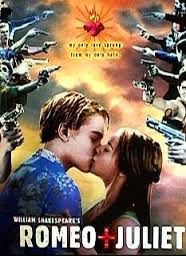
WILLIAM SHAKESPEARE’S ROMEO + JULIET
US, 1996, 105 minutes, Colour.
Leonardo Di Caprio, Claire Danes, Paul Sorvino, Diane Venora, Christina pickles, Brian Dennehy, Pete Postlethwaite, Miriam Margolyes, Harold Perrineau, Vondie Curtis Hall John Leguizamo, Jesse Bradford, M.Emmett Walsh.
Directed by Baz Luhrman.
Baz Luhrmann has a powerful imagination. Not only have he and his co-writer, Craig Pearce, updated the setting of Shakespeare's Romeo and Juliet to a Miami-style, Verona Beach (though filmed in Mexico), he has provided visuals that stun the eye and stimulate the mind. It needs to be seen more than once, but, after one viewing, I think most of it works very effectively. Much of the language and poetry seems quite topical and relates to corporations, gangs, fashion and a kitsch mediterranean Catholicism as well as love and death.
Leonardo Di Caprio is a credible Verona Beach Romeo, Claire Danes is an unglamorously persuasive Juliet. The Capulets (Paul Sorvino's mobster rage and Diane Venora's frivolous ambition) make more impression than the Montagues although the camp performance by Harold Perrineau as Mercutio is striking.
And the accents are American. But the entire cast is able to maintain the verse rhythms even in the most unlikely settings and situations that Luhrmann almost assaults us with.
A largely Australian production team have gone over the top in design, costumes and musical background. But, despite the op art style, this is a strongly intelligent interpretation of the play and of theatrical screen staging. Striking contemporary Shakespeare.
1. The many film versions of Shakespeare’s play? Ever-popular? The 20th-century, this version for the 1990s?
2. Baz Luhrman, his career, his pizzazz? The editing of the text?
3. The cast, Leonardo Di Caprio and Claire Danes at this stage of their careers? The character actors?
4. Verona Beach and the contemporary equivalents of locations, contemporary means of communication? The songs, the score? The television introduction and conclusion?
5. The characters and their performance, contemporary yet fitting with Shakespeare’s verse? The captions identifying each of the characters, as a Montague or a Capulet?
6. The production design, costumes and decor, make-up?
7. The familiar plot, the film’s screenplay fidelity to Shakespeare’s text?
8. Romeo, a Montague, pensive, young, pining for Roseline, Mercutio, his Queen Mab speech, his make-up, style, over the top, the Capulet party, Romeo going, the mask, seeing Juliet, not knowing who she was? the singer and performance? The lyrics for the meeting between the two? Looking through the fish tank? Romeo learning who Juliet was? Staying, coming back to the balcony, the balcony scene? The Montague gangs and types? Fighting, Romeo involved, killing? Going to see Friar Lawrence, talk, arranging the marriage, the wedding, the wedding night, Romeo and the death and his having to leave? The messages for him to return, Juliet’s death, his buying the poison, his killing himself, the tragedy?
9. Juliet, her father like a gang boss, her mother and her fussiness, the nurse and Juliet’s relying on her? Juliet, young, the prospect of marriage to Paris, her scenes with him? Going to the party, the dance? Falling in love, learning who Romeo was? Pining with the nurse? The nurse, the arrangements, the wedding, the wedding night, Romeo’s exile, taking the drugs, expecting to come to life again, seeing Romeo, her death?
10. The Capulets, their wealth, control of the city, their style? The mother’s concern for Juliet? The Montagues, more low key? The clashes between the families? The various types, the fights, the gangster styles, thugs, their sword guns?
11. Captain Prince, the police, the helicopters, calling the families to order and laying down the law?
12. The city itself, the visuals, the statue of Jesus, the Catholic iconography, even in the store where Romeo bought the poison?
13. The role of the media, information?
14. The ending, Shakespeare’s epilogue and the nature of the tragedy?
Published in Movie Reviews
Published in
Movie Reviews
Tagged under
Saturday, 18 September 2021 19:52
Darker than Midnight/ Piu buio di mezzanotte
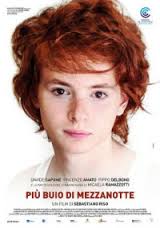
DARKER THAN MIDNIGHT/ PIUI BUIO DI MEZZANOTTE
Italy, 2013, 94 minutes, Colour.
David Capone, Vincenzo Martino, Michaela Marazzotto.
Directed by Sebastien Riso.
Darker than Midnight is a story set in Catania. It opens with images of a searching young boy who puts lipstick on a glass. He leaves home and then wanders the streets of the city.
The action in the present concerns David, the 14-year-old, unsure about his sexuality, loved by his devoted mother, assaulted by his demanding father.
The picture of the streets of the city is certainly dark, focusing on a group of young men, some boys, who act as prostitutes, some transvestites like one who wants to be Marilyn Monroe, others who live in with their patrons. At first, David resists any sexual activity, rather observing and becoming friendly with the group. He joins in when they shoplift at the supermarket. He is offered some patronage, especially by a man in a white, who is keeping another young man. The streets are hard and the man who first befriended him is killed.
There are many flashbacks to his childhood, his relationship with his father, with his mother. His father’s brutality, especially when he examines the attic where David has papered the walls with posters and art and destroys it. He turns up several times to demand that David return home, once in a church where David is sitting with his grandmother.
Ultimately David falls on hard times, is hungry, dirty, but find some patronage and some serious sexual experiences.
It is hard to know where his life is leading because his father attempts to abduct him, bashes some of the men in the street, when David pulls his knife and attempts to kill himself.
At times, the film is drama, at other times it pauses for a lot of contemplation and reflection.
1. The title? The darkness of night? The darkness of David’s life on the streets? The darkness was of his life at home?
2. The Catania settings, home, attic, the streets, the world of the prostitutes, the dark alleys, darkness and daylight, the gardens? The church? The funeral? The musical score?
3. David story, the introduction to him, age 14, androgynous, in the attic, the walls, the lipstick on the class, his leaving home, his haversack?
4. David on the streets, meeting the various types, their behaviour, talk, the bonds? The clients? The police? The mute photographer and the records? Those offering David protection? His not being involved in sexual activity on the streets? Stealing the supermarkets? Present with the group? His going to the church, his grandmother and the embrace, his father demanding he come?
5. The types of the streets, the initial friend, with the white hair, going to the theatre, the being propositioned, the Marilyn Monroe type, tough, behaviour?
6. His going to hear the singer, his own singing, the delight, going to the caravan and wanting to go with the singer?
7. The flashbacks, his mother and her tenderness, fear of her husband? His fears? Her caressing his body? Going to the doctor, the measurements, the father and his assaulting his son? Smashing the attic?
8. David and his being desperate, the sexual encounters, the death of his friend, his grief at the funeral? At the shop and stealing? Begging in the supermarket, being ousted after his abuse? Looking in the garbage? Meeting his mother, the long whispering to her on the bus, his getting out of the bus?
9. The protector, his house, his explanations, singing, the sexual encounter, the long circular shop around the room, David and his washing, the other friend? Kate is a corner, not being picked up?
10. Going to the mute photographer, this into the record, the sadness of the photography hearing of the death and putting up the photo amongst many?
11. David’s father, pursuing him, fighting with the prostitutes, David getting the knife, attempting to kill himself?
12. At the hospital, the father protesting that he didn’t do it? David with a long look in the mirror and his screaming?
Published in Movie Reviews
Published in
Movie Reviews
Tagged under
Saturday, 18 September 2021 19:52
Those Happy Years/ Anni Felici
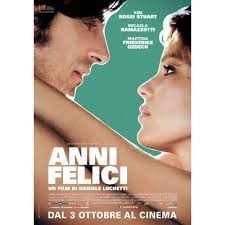
THOSE HAPPY YEARS / ANNI FELICI
Italy, 2013, 106 minutes, Colour.
Kim Rossi Stuart, Micaela Ramazotti, Martina Gedeck, Samuel Garofalo.
Directed by Daniele Lucchetti.
Those Happy years Years is partly memoir and partly portrait of a self-centred artist.
The artist is played by Kim Rossi Stuart, a womaniser who still loves his wife and his children, often having them in the studio while he works. His wife, Micaela Ramazotto, who also played a devoted mother of a teenage son in Darker than Midnight, is in love with her husband, caring for her two sons.
Dario, the older of the sons, is reminiscing about his teenage days, his father and his work, his love for his mother but also their clashes, and her relationship with her father’s agent, a lesbian relationship which leads to her leaving the family. At one stage, Dario dives clothed into the water, saying that was the only way in which he could get his parents’ attention.
The father has a performance session in Milan which a critic is very severe on, criticising the father and his personality as unlikeable and not having anything to say. Later, the father has a change of heart, creates an enormous sculpture which he explains to his wife is really called after her absence.
The director also made a film about a troubled family, My Brother is an Only Son.
1. The title, the implied irony? The comment that happy years were not realised at the time? The young boy, his adult perspective, on himself, his brother, his parents, their way of life?
2. Re-creation of the period, the cities, homes, the art world, studios, classrooms? Restaurants? The sea on the beach? Italy and France? The musical score?
3. Dario comic is age, perspective, his memories, his experience of each parent, love, his grandmother, the holiday, at the beach, his throwing himself into the water and having to be rescued, his father’s reaction? The time in France? Adolescent love? Issues of innocence?
4. Guido, his career, working with the models, sensual, nudity, the moulds and his work with them? Sexual relationships with the models? The boys present in his studio? His classes students, his wife bringing the boys? His love for his wife, yet betrayals? Self-centred, arrogant in manner, seductive in manner, his not wanting his family to come to his performance part? Healthcare, his agent, the plan for Milan, the show, the naked models, his stripping, his being painted, asking people to come forward, hesitance, Sabrina coming forward, ring painted, his response? His aim, to embarrass people? Looking for the newspaper reviews? The critic, the discussion, telling the truth about not liking him, being superficial? The go Guido punching him? Surrender on the phone, discovering the show was a failure? His return home?
5. The critic of the truth, his being upset, home for the holidays? His mother and her criticism? His final venomous outburst against her? Her response?
6. The boys, watching their father at work, knowing the truth about his relationships, going to the beach, playing? Dario jump into the water, his being rescued, the repetition of the sea later? His wanting to be noticed?
7. Healthcare as the agent, with ego, with Serena, then talk, the feminist attitudes, going to France, the seductive talk, the kiss, Sabrina and her confusion? The issue of freedom?
8. Serena, her character, staying with ego, loving him, her devotion to the children? The talk with hell, kiss, the affair, return home? The phone calls, wanting to be with hell?
9. Talking with ego, love affairs, telling the truth, his angry reaction, her leading?
10. Hugo and his art, his work, the huge project, people coming to see it, walk around it? The critic, his liking it, like indeed oh, going to eat and drink with
him? Digger explaining to Serena that the artwork was her absence?
11. The future, the couple sometimes being together for months, years? The final credits, the repetition of Dario under the water and his being rescued? The effect on him? And the some recall large of images of the whole film?
Published in Movie Reviews
Published in
Movie Reviews
Tagged under
Saturday, 18 September 2021 19:52
South is Nothing, The/ il sud e niente
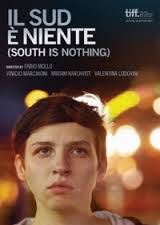
THE SOUTH IS NOTHING/ IL SUD E NIENTE
Italy, 2013, 90 minutes, Colour.
Miriam Karlkvist, Vinicio Marchetti.
Directed by Fabio Mollo.
The title is rather pessimistic – and so is the film.
The city is Sicily, the town of Catania. The focus of attention is on a teenager, rather androgynous in look and manner, who is eventually revealed as a girl. She lives alone with her widower father, upset that her older brother had disappeared five years earlier. She keeps looking for him, sometimes thinking that she sees him.
Her father is getting rather desperate and the Mafia is interested in buying his fish market store. He does not tell his daughter but wants her to pass exams so that they can move away from Catania to go to Turin.
There are a number of clashes between father and daughter, but her grandmother is there for love and support.
A mixture of realism and magic realism.
1. A story of Catania? The realism? Magical realism? Grim?
2. The title, the Italian, the people, opportunities and lack of opportunities? Considering themselves as nothing?
3. The locations, the city, the cityscapes, the water, homes, the beach, the shops? The fairground? The musical score?
4. Grazi’as story? Age, appearance, the audience thinking she was a boy? Androgynous? Not hearing her name until the middle of the film? Yet the talk about her? In the water, looking in the mirror, her shirt, her body? Relationship with her father, opening the shop, serving the customers? Her anger, walking away? Memories of her brother, the boat with his name on it? Her father being stern? Her mother dead? The scenes with her grandmother, nice, supportive? At school, the friendship with the boy, taking the exams? The two together? The revelation of her being a girl? Her moods, search for her brother, the exhilaration of the dance with the boy? The teachers commenting on her results? Defending her father? Her seeing her brother, her friend taking her to find him? Her father and his selling the shop? Her outburst, wanting the truth? In the water? The boat? Her brother’s visits? Real or unreal? Her father explaining that he was dead, that he was shot five years earlier? The grandmother saying that if he appeared he wanted to communicate something? Perhaps, the reassurance for Grazia?
5. Her father, his age, the shop, customers, relatives living in Turin, the possibility of going there for a better life? His wife dying? His son being shot? bringing up Grazia? Strong about her exams and study? The shop, the Mafia wanting to buy at, his friend’s visits, the advice? Selling the fish? No deliveries, the phone calls? Coping with Grazia? His relationship with his mother, kissing her, talking? Going to the woman, the deal for selling the shop? The friendship from the woman across the street, the attraction? Grazia demanding the truth?
6. The grandmother, nice, waiting outside the church for Pietro? Supportive? The end?
7. Pietro, the mystery, bringing up Grazia, Grazia and her memories and voice-over of the stories about him? His death? Alive – or visitations?
8. The grim story, the possibilities for hope? Is it true that the south is nothing? That people would have to move for any better life?
Published in Movie Reviews
Published in
Movie Reviews
Tagged under
Saturday, 18 September 2021 19:52
Mafia Kills only in Summer, The/ La Mafia uccide solo in estate

THE MAFIA ONLY KILLS IN SUMMER/LA MAFIA UCCIDE SOLO D'ESTATE
Italy, 2013, 90 minutes, Colour.
Alex Bisconti, Pif, Cristiana Capatondi, Ginevra Antone.
Directed by Pierfrancesco Diliberti (Pif).
The Mafia only Kills in Summer is quite an entertaining story, set in Palermo, much of it in the 1980s when the Mafia were dominant in the city, a violent period with assassinations, especially for judges who came in with integrity to reform the situation.
However, it has a light touch as well because it is the story of Arturo, and he narrates the coincidence of his conception with a Mafia killing, along with some visuals of the conception, grows up and as a boy at school is interested in journalism, especially when the see Giulio Andreotti on the television and finds him a role model, even dressing like him at a fancy dress party. He is also attracted to Flora, a fellow-student who ultimately moves away from Palermo to Switzerland.
Arturo interviews one of the judges sent to Palermo and soon assassinated. This reinforces his desire to be a journalist. However, when he becomes an adult, he finds it hard to get a job, plays the piano in a political television show – which leads to a fiasco when he discovers that Flora has returned to Palermo and is secretary to a politician.
There are further assassinations, political complications, but Arturo and Flora finally get together for a happy ending.
An entertaining way of looking at very serious situations in Palermo.
1. The title, irony and the truth?
2. Palermo story, the locations, the city, homes and streets, shops and bars, church, school, radio stations, media? The musical score?
3. The periods, especially the 1980s, the look, the sound?
4. The history of Palermo and the Mafia? Names and dates? The mafiosi types? The police? The judges and their coverage, decisions and
administration? assassins? The killings and the consequences? The national government in Rome? Andreotti?
5. The narrative, Arturo and his commentary, the playful aspects of his conception and birth, the images of the sperm? His parents, the apartment, the killings? His conception? As a boy? The birth his brother? His parents, family life?
6. The Mafia, reports of their activities, denials in Palermo? Yet the violence, a society dominated by the Mafia? The bosses and their ruthlessness? Assassins who are dumb and vicious? The ease in the killings? Financial gain, power?
7. Arturo as a boy, at school, Flora, the connection, his friend and the rivalry? Buying the food for Flora and putting it on her desk? The other boy claiming the gift? Flora thinking Arturo was a liar? His claim that there was a mafia man in an apartment – but it was only a journalist? The friendship, Flora moving to Switzerland?
8. Andreotti, as a figure, his appearance, walk, his wife? Authority and government? His reputation, later charges? Arturo and the discovery of Andreotti? Admiring him, watching on television, taking his advice, imitating him, the fancy dress? The children’s reactions?
9. The competition, his writing, winning, talks with the journalist, the journalist and his advice about creativity? Ambitions? Interviewing the politician, his sudden assassination? Witnessing the death on the streets? The television, the reports about the Mafia in Sicily?
10. The interview with La Scala, his earnestness? With the other politicians? Judgements?
11. As an adult, employed, Jampierr, playing the piano, at the rally, seeing Flora, the fiasco of his piano playing, the threats to his job?
12. Meeting Flora, being a political secretary, offering him the job, their discussions? The slogan of Sicily needing Europe as Europe needed Sicily? Flora and her writing the speech? Arturo’s reaction, resigning? Flora checking the speech with her father, that the politician would not have used it? His assassination?
13. The aftermath, the wedding, the children? Happy ever after?
14. The human story, the humorous side, the reality of the Mafia?
Published in Movie Reviews
Published in
Movie Reviews
Tagged under
Saturday, 18 September 2021 19:52
Manxman, The
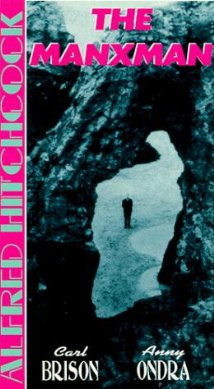
THE MANXMAN
UK, 1929, 110 minutes, Black and white.
Anny Ondra, Carl Brisson, Malcolm Keen.
Directed by Alfred Hitchcock.
The Manxman is one of Alfred Hitchcock’s last silent films. He made quite a number of films in the UK, also in Germany, during the 1920s, including one of his most celebrated films, The Lodger.
This is an emotional film, a variation on the love triangle. It set in the Isle of Man and captures much of the rugged beauty of the island, its isolation, even though boats went to Liverpool and to Africa.
The silent film style requires strong presence from the cast, which they offer, intensity of expression accompanying the subtitles.
Two young men grow up together, are friends, but both are attracted to the same woman. One is a fisherman who thinks the woman is in love with him and goes off to sea. The other, whom she secretly loves, is educated and becomes a lawyer. When news comes of the sailor’s death, the couple marry – but he returns. The woman leaves the sailor, tells him that her child is not his, attempts suicide. The culmination is in the court where the lawyer is presiding, is exposed and has to resign his position.
Worthwhile Hitchcock film.
1. The impact of this Alfred Hitchcock film? His work in the 1920s? Silent Western Mark black-and-white? Reliance on the performance, screen presence, use of captions?
2. The Isle of Man settings, the sea, the town, the homes, the interiors, the courts? The rugged coast? Atmosphere?
3. The biblical reference? The moral?
4. The sea, the framework, the isolation, the traditions, boats to Liverpool, to Africa?
5. The three friends, Pete, rough, his work, at the Inn? Phil, better educated? Kate, her relationship with her father? The bond with Pete? Loving Phil? The farewell? The letter, news of the death, Pete still alive, his hopes?
6. The relationship between Kate and feel? Phil? The bond between Phil and Pete? Growing up together, the nature of their friendship? The relationship with Kate? Her father’s judgement about each of them?
7. Phil, the law, his becoming the magistrate Western Mark
8. Pete, the return, marrying Kate, her being pregnant? The desire for Phil? Antagonism between the two men?
9. Kate, leaving Pete, saying the child was not his? Her suicide attempt?
10. The matters in the court Western Mark the revelation about Phil and his relationship with Kate? His resignation?
11. The power of performance of three characters, getting emotional response? A reworking of the eternal triangle?
Published in Movie Reviews
Published in
Movie Reviews
Tagged under